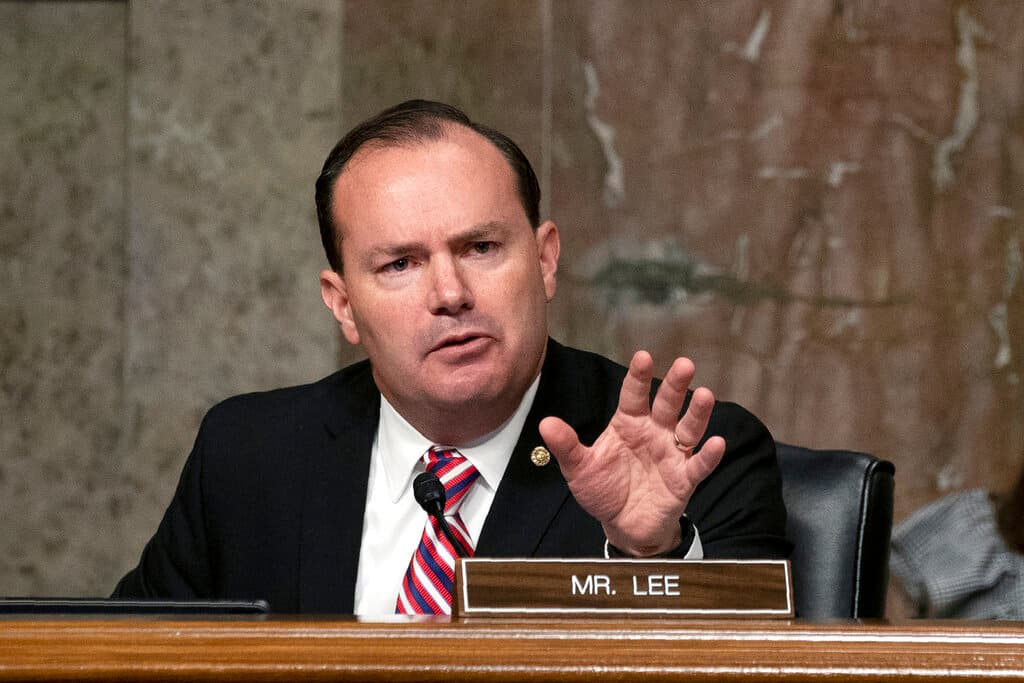The Federal Reserve: Mike Lee’s Moment
The senior senator of Utah is in the van of burgeoning Congressional scrutiny of the Fed itself as the root of today’s economic crises.

The most striking development in respect of the Fed this week isn’t today’s quarter-point interest rate hike, but the awakening in Congress to the possibility that the Fed itself is at the root of today’s crises. The senior senator of Utah, Mike Lee, puts it succinctly by tweeting “End the Fed.” The House Freedom Caucus notes that the Fed “set the conditions for this crisis.” It’s nice to see the solons catching on.
We don’t want to overstate the level of support for efforts to reform America’s central bank — or understate the scale of the work that will be required to restore an honest dollar after our half-century experiment with fiat currency. Yet it’s encouraging to see Politico report that “anti-Fed sentiment” has returned to the halls of Congress after “a rare period of political insulation” during the last several years.
With inflation raging, and bank runs raising fears of contagion in the financial world, “the Fed is on the precipice of blowing its political capital,” Politico contends. The Deseret News finds Mr. Lee in the van amid “increased scrutiny from policymakers” toward the Fed. “Given that the Federal Reserve often causes the very thing it was designed to prevent, perhaps it’s time to revisit its structure and role,” Mr. Lee observes.
Mr. Lee contends that the Fed “is to blame for inflation,” the News reports, and is questioning “its role in monetary policy.” His remarks follow a lament by Congressman Thomas Massie that “the Fed doesn’t control inflation, it causes it.” The Freedom Caucus says the Fed “mismanaged interest rate policy” and its “own balance sheet,” then reacted “by rapidly increasing interest rates after keeping them artificially low for far too long.”
Plus, too, the Financial Times is tuned in, noting how the run on Silicon Valley Bank laid bare “fresh divisions over US banking reform” and raised the prospect of “legislation to shore up the financial system.” The FT’s Brendan Greeley notes that the Silicon Valley Bank collapse “raises a question: Who gets to create dollars?” Thus the banking crisis intertwines with the debasement of America’s currency.
As the Federal Reserve Act moved through Congress in 1913, the press called it a “Currency Bill” as often as a “Banking Bill.” The New York Sun was adamant about “the danger which is pending in the currency bill” — the ability of the proposed central bank to issue paper money, which, the Sun’s editors warned, “cannot fail to menace the gold standard.” The paper Federal Reserve notes proposed in the bill raised worry in Congress, too.
The Fed’s founder, Carter Glass, was grilled over the Fed’s paper money being convertible not only in gold but “in lawful money,” meaning other paper dollars. Won’t this “fail to uphold the gold standard?” he was asked. Glass insisted the bill “upholds the gold standard in every particular.” Why, if the Fed “redeems a note in greenbacks,” the bills can be brought to the Treasury “and gold demanded for it, under the act of March 14, 1900.”
That’s the McKinley-era law that set America on the gold standard. The Sun’s editors were unmoved, urging that “Government notes shall be made redeemable in gold only and be protected by reserves of gold only.” The Sun said “no one has yet pointed out how the Treasury” could manage “the tremendous responsibility of maintaining” the gold value of government paper money “issues to unlimited amounts.”
Talk about editorial prophecy. It reminds that it was Congress that got us into our current financial and monetary predicament. It is the part of our generation to grasp that Congress will have to get us out of it. All the more reason to welcome Mr. Lee’s fervor. He notes that the Fed, “by keeping many decisions involving monetary policy away from elected officials” has been granted “a degree of deference historically reserved for despots.”

